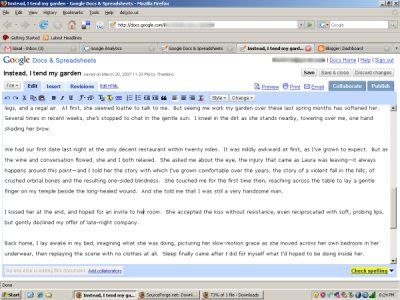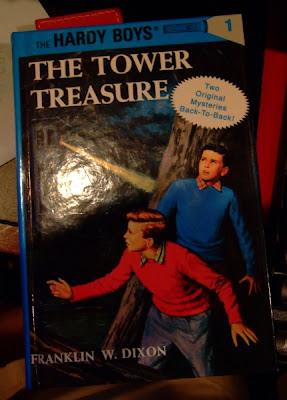
An unknown novelist attempting to grow into a little-known novelist. I offer--free of charge--writing tips, anecdotes, short fiction, and assorted ramblings (with photographs and other random tid-bits thrown in for good measure)
Thursday, March 29, 2007
Writing Tip: Find Yourself a Strong Critic
Last night, I was talking with a writer friend when she asked me what I planned to do with my first piece of flash fiction (process described here).
I told her that I hoped to do a tiny bit of editing and then send it off to Zyzzyva (an elite fiction mag for west coast writers).
“Wow. That’s…ambitious,” was the response, or somewhere thereabouts.
I felt like a southern dandy walking into a Savanah dinner party after Labor Day wearing my white linen suit…
with a crusty booger in my moustache.
Not overt, I promise. But I’m good at reading between the lines.
I think, if she knew me better, if we had a long-standing relationship as friends/fellow critics, the words, “Are you crazy?” might have fallen to the floor.
So, here’s the thing:
We all need serious, hard-nosed, constructive criticism of our work. Each of us has a range of precision with which we can judge the value of what we’ve written. For some of us, the difference between a Booker Prize story and one that we wouldn’t use to line a mynah bird cage is indistinguishable. Others have a sharper eye. They can tell, perhaps, that a story perfectly fit for Juggs magazine wouldn’t make the cut at Atlantic Monthly.
The obvious question, then, is how do we find a trusted critic?
I wish there were a paint-by-numbers way to get this done, but there isn’t.
I can tell you that your mother—or any mother-like proxy—is not the person you’re looking for. At a certain point, you have no need for any more self-esteem-building feedback. Having someone say, “That’s a cute story, dear,” pat you on the head, and send you off to play with your gender-neutral doll--after, of course, reminding you to “remember to use your words” --will not help.
Strong criticism will hurt. Get over it.
The best I can do, by way of recommendation, is to say that you need to be regularly interacting with other writers, seeing their work—both the writing and the criticism—and coming to understand how to gauge what they say.
At a certain point, you will likely find someone in the group whose opinions you trust. Ask them for help, and offer to give yours in return.
If you’re lucky, they’ll tell you about your out-of-season fashion and point out that occasional dangling booger.
Wednesday, March 28, 2007
Mystery Nonpareil

For the last few days, I've been reading The Best American Short Stories from 2005. So far, everything I've read has been impressive, but one story--Until Gwen by Dennis Lehane--stands out.
It's been a while since I last read anything by Lehane, and a long while since I read what I consider his most powerful, early novels. I've somehow managed to forget just how vibrant, human, and shocking his work can be.
One novel in particular, Darkness Take My Hand (pictured above), should be high on your reading list if dark, brooding mysteries appeal to you.
Don't Put Your Stories at Risk
Remember those heart-rending stories you wrote back in 1983, Reagan's first term, with the world's most popular word processor, WordStar? When all your parts were still young and firm.
Just how likely are you to be able to open those gems today?
I'm guessing it'll be a struggle.
Well, it just so happens that I've got a suggestion.
In addition to your normal Save-and-Backup routine--you do back up regularly, don't you?--also save your files as raw text. Text files are the lowest common denominator on any operating system and can be opened by any text editor.
This will protect you from 'progress' and defend those dreamy-eyed tales from oblivion.
Tuesday, March 27, 2007
Fly, Pelican, Fly*

Coincidental to my recent post about crows, there was a lot of talk over at Art and Perception about them.
Must be something in the air.
*An absurdly obscure reference to the movie Scarface, in which Al Pacino sees a group of flamingos and implores them to 'Fly, pelican, fly!'
Monday, March 26, 2007
10 Tips for Writing Great Dialog (part I)
- Don't always speak directly to the problem
Stackhouse stared at Monique through those inscrutable wraparound sunglasses, a face-splitting grin on his face. "I'll be getting that money back now, Nique. You can bet your bootylicious ass on that."
For her part, Monique was shaking visibly, tied naked to the chair as she was. "I don't know what you're talking about."
With a shake of the head--he'd known this absurdity was coming--Stackhouse strode across the room and kicked the chair out from under his star. "I know you been working with Lansky. So cut the crap."
The direct approach works well enough, as far as it goes. But if it's the only approach you take in your storytelling, you miss many opportunities to surprise your reader. They will know pretty well ahead of time exactly how the scene's going to play.
Instead, at least occasionally, try the oblique approach.
Stackhouse stared at Monique through those inscrutable wraparound sunglasses, a face-splitting grin on his face. "How's everything goin', Nique? You look kinda uncomfy in that chair."
For her part, Monique was shaking visibly, tied naked to the chair as she was. "I don't don't even know why they brought me..."
With a shake of the head--he'd known this absurdity was coming--Stackhouse strode across the room and kicked the chair out from under his star. "That better?" He took his shades off and folded them at his side. "Did you know I fed Lansky's balls to my dog last night?"
"What?" She looked terribly uncomfortable now. "What?"
"You got something you want to tell me, Monique?" - Don't put tags too late in the dialog
It's easy, and common, to put the tag too late in the sentence for it to have its intended affect--and late enough to make the sentence awkward.
"I'm not talking about the fishing boat, for crying out loud. I'm talking about the three dead guys who got tossed off it. I'm talking about corpses floating in the Pacific," Inspector Swann said.
If there's a chance that we readers actually need a tag to guide us, this one comes too late. We've been confused about the dialog, or may have attributed it to the wrong character, for too long.
Try:
"I'm not talking about the fishing boat, for crying out loud," Inspector Swann said. "I'm talking about the three dead guys who got tossed off it. I'm talking about corpses floating in the Pacific."
Or, perhaps better still...
Inspector Swann dropped his cigarrette and ground it into the gravel. "I'm not talking about the fishing boat, for crying out loud. I'm talking about the three dead guys who got tossed off it. I'm talking about corpses floating in the Pacific." - Eliminate stupid tags
Don't have your characters expostulate, ejaculate, enthuse (please, please, please--it's not even a word), or proclaim.
Use 'he said,' 'she asked,' and eliminate the rest of it.
"Won't you please fly down there, Harold?" Gertrude exhorted. "I think our children's lives may depend upon it."
Instead, do this...
"Won't you please fly down there, Harold?" Gertrude asked. "I think our children's lives may depend upon it."
Or this...
"Won't you please fly down there, Harold?" Gertrude glanced out the window at the rain, closed her eyes briefly before continuing. "I think our children's lives may depend upon it." - Go tagless when you can make it work
Straight tags--meaning 'he said/she said'--have a thankless job. All they're good for is attribution. So why not, when it's possible, eliminate the wastage altogether?
"Did you see that little dog, the Jack Russell?" Layla asked.
"Yes," Paul said. "Appeared to be humping Father McGreggor's leg."
"Very uncomfortable," she said.
"Quite," he said.
In some cases, eliminating the straight tag will require an action tag.
Layla froze mid-sentence, her mouth hanging open. "Did you see that little dog, the Jack Russell?"
"Yes. Appeared to be humping Father McGreggor's leg."
After blinking twice, she remembered to close her mouth. "Very uncomfortable."
Paul gave a faint grin. "Quite."
In others, when the rhythm just works, you can skip tags altogether.
Layla froze mid-sentence, her mouth hanging open. "Did you see that little dog, the Jack Russell?"
"Yes. Appeared to be humping Father McGreggor's leg."
"Very uncomfortable."
"Quite." - Don't let characters teach each other things they already know
For example, follow the exploits of two brainy zoologists investigating an apparent burglary at the zoo.
"As you know, Chase, for a monkey-flung turd to reach window-breaking velocity, the primate must have developed an arm strength equivalent to Nolan Ryan squared times 1.115 per second/per second."
"Of course." Chase nodded sagely. "Of course."
If they both know this stuff, why in God's name are they saying it to each other?
Instead, get clever.
The two men examined the broken glass a moment before Chase whistled with a wary sort of respect. "How many monkeys do you know who can hurl a turd twice as fast as Nolan Ryan?"
Saturday, March 24, 2007
Crows? Ravens? Who Cares--They're Cool EIther Way

I've always* loved crows. I love their smart, mischievous, cocky ways. And I love that some of them burst at the seems with personality.
In what has felt like an accident, I've photographed them a fair bit lately, some part of my infatuation showing through in the direction I point my camera.
*except the time I spotted them on a golf course in the desert, attacking a family of young squirrels that had stranded itself in the middle of a fairway.
Persistence Revisited
In my youth, persistence was not my greatest strength. I was certainly passionate about the things I was pursuing, and I could work very hard. What I wasn’t very good at was plowing through external resistance.
There were probably many reasons for my inabiltiy to mow down serious obstactles, but I'll leave most of that investigation for my therapist (when I finally gather the good sense to go get one). The reason that matters to me here is that, fundamentally, I lacked confidence. It’s hard to persist when, at least at some level, you’re convinced you’re supposed to to fail. Even into early adulthood, I believed that successful people had some magical skills that I didn't possess--and could never possess.
So, when my first attempt at a novel got rejected--even rejected with complimentary words in a one-page single spaced response from a successful agent--some part of me understood that it was supposed to end that way. Enough said.
A response that would thrill me today convinced me that I was wasting my time, that I was only pretending. And soon after that, my initiative curled up in a ball in the corner and died of neglect. It wasn’t quite as simple an issue as I make it sound. There were other pressures, as well, pressures to get a real job, pressures to really make my own way in the world—I had, after all, stretched the limits of my parents’ patience.
I look at those times now and think about how much better I’d approach the problem in my current skin. But there’s a funny danger in that thought, as well; I’m sure that even now I’m not always--and consistently--applying those lessons to my life as it exists today. It’s one thing to learn how to look back with a smartly critical eye, but it’s a bird of a very different feather to learn how to apply wisdom to your activities in the here and now.
So, if I understand the value of this whole persistence thing--if I actually 'get it'--why bother studying the quote at all? Well, that's simple. Even now, when I understand the truth of what Coolidge said, it helps to be reminded with regularity. Real learning, after all, comes from repetition.
It's an immesearable relief to know that success doesn't acrue to those with mystical qualities as much as it does to those who dogedely stick it out.
Traveling

There's an interesting frustration inherent in publishing photos to the web. Many of the pictures I like best don't shrink well. The overall structure disappears, or a meaningful detail ends up looking like dust on the sensor. So I'm stuck with contradictory urges; I'd like to explore much bigger images, which can reward subtlety, and I want want to take images that work okay for the web.
Thursday, March 22, 2007
Glory Days

starring Seinfeld's Uncle Louie behind the mask (in undoubtedly leaner times)
Coming out of film school, I worked on a series of low-budget Indie films ranging from a full-length suspense movie shot on Super-8 to USC masters projects to honest-to-goodness low-budget 35mm genre films.
None of the films, as final products, were particularly memorable. But one, for the experience alone, has a soft spot in my heart.
I came into what was then called Blood Hungry --later renamed Sorority Girls and the Creature from Hell by its distributor--during a vitally necessary reshoot. It seemed the low-budget monster flick was both too short and offered far too little exposed nipple for its running time.
So, our charter, on this second shoot, was to inject suspense, violence and
 nudity.
nudity.In a twist of cruel fate, it turned out the female star of the film was indisposed (ran for the hills? entered the witness protection program?) at the time of the reshoot. So, what was an industrious director to do?
Well, I don't know what an industrious director would have done, but the one I was working with hired a second woman, a woman who was more amenable to topless acting (see her front and center on the poster above), and then he proceeded with the shoot like nothing had happened.
As a jack-of-all-trades on the set, I was called to (among other things) operate the boom mic, lay dolly track, set up lights, and, later, edit sound.
One day early in post-production, long after all the nudity had ended, the director handed me a Sharpie and approximately 22 million feet of 16mm mag stock (sound track for editing), asking that I write the footage count every foot with the pen.
Now, for the unitiated, film sound labs had machines to do this kind of work. And they did it for perhaps 5 cents a mile of stock (exagerating a tad in all directions here, but you get the idea).
When I told the director in no uncertain terms that I wasn't going to be writing numbers on mag stock for the next thirty years, he told me I'd never make it in the world of film post-production.
And in a sense, I guess he was right.
P.S. The film was famous for a day when it aired on USA's Up All Night, a nationally syndicated show in which commedienne Rhonda Shear lampooned the movies at the commercial breaks.
P.P.S. If you should foolishly get the idea that this film might be bad enough to be a sort of guilty pleasure, forget about it. Guilty, yes. Pleasure? No chance.
Tuesday, March 20, 2007
Another Interesting Word Processing Option

I've taken to using Google Docs & Spreadsheets for a large part of my writing lately, and I can say simply that it has a lot to recommend it.
What Works?
- It's free. So all you risk to give it a try is your time.
- It's web-based, meaning anywhere you go--assuming you've got a web connection--your word processor and your documents go with you.
- It has a nice built-in document versioning feature. At any time, you can revert to any save point. It also has a view that allows you to see the changes you've made between saves.
- It has nice collaboration tools. It's easy to allow others to view and/or edit your documents with you.
- It has very shallow learning curve. It's not the most feature-rich word processor in the world. But that's more virtue than vice when it comes to writing fiction. We don't need four-thousand formatting options, tables, a clip-art editor, snaking columns, and a slow-witted grammar checker. Instead, we need basic fonts, double-spacing, word count, and spell checking. Docs & Spreadsheets provides these features and more.
- It both reads and writes to a wide range of formats.
How do I get it?
All it takes to get hold of Docs & Spreadsheets is an active gmail account, which is another great free service from Google.
Words That Resonate

Nothing in the world can take the place of persistence.
Talent will not; nothing is more common that unsuccessful men with talent.
Genius will not; unrecorded genius is almost a proverb.
Education will not; the world is full of educated derelicts.
Persistence and determination alone are omnipotent.
Calvin Coolidge
I'll have more on the wisdom of my pal, Cal, in the next post...
Sunday, March 18, 2007
How Hard Can It Be?
I know, I know...how serious could I have been to think I could accomplish something in the time it takes some fiber-deprived people to relieve themselves? What can I say? Sometimes hubris gets the better of me.
The interesting point, though, is the fact that I did have something interesting in an hour-and-a-half. At least I thought so when I first read through it.
But that feeling lasted only three seconds beyond The End. In as little time as it took me to have a coherent thought, everything felt mushy and imprecise. So, back the story went for some surgery.
I carved out words. I reinforced thoughts. I shuffled sentenced and phrases.
Then I read it again and still found it wanting.
Five or six times I went through this edit-print-crumple cycle, marking my dissatisfaction with a red pen.
Finally, perhaps six hours beyond my initial budget, I got to a place that the story doesn't scream at me for further face-lifts. I can't say for sure whether it works yet, but it's better than it was, and, for now, it's as good as I can make it.
The point of this post, I guess, is to tip my metaphorical hat to the writers of good flash fiction. Yours is a consice, efficient, energetic discipline.
I hope I don't embarrass myself too badly with my early attempts to join you.
P.S. The title is--I hope obviously--tongue in cheek.
Saturday, March 17, 2007
The Favorite Place I Know

I spent summers in my youth on this lake in New Hampshire. It was easily the most uncomplicatedly (to invent a word) joyous time in my life.
If you've seen On Golden Pond, you've experienced something very close to my story...reluctant suburban teenager spends time with seasoned adults, learning the joys of a simpler rural life.
When I'm terribly stressed as an adult, I often relive an afternoon spent on the lake--on a floating air-mattress, to be precise--intermittently napping with my hand wound round a buoy rope. It was breezy that day, and I can still feel the tiny waves lapping at the side of the mattress, can still hear the oak and birch leaves chattering.
I had no-where to go but that spot, nothing to do but enjoy the moment. And I knew, even at fourteen, that it was something special.
More Great Short-Form Writing
And Now, For Something Different
In an effort to spruce up the Writer's Hearth neighborhood, I've invited Renee Holland Davidson, a fellow writer who focuses on flash-fiction, to contribute to this blog on a semi-regular basis. I'm hoping her skills won't so obviously dwarf mine as to make me look puny by comparison.
I'll let her take it from here.
Hello, all. I'm Renee. On good days, I brazenly call myself a writer. On not-so-good days, I'm a wannabe, and when the rejections pile up, I'm a fraud, a poser, a has-been who never was.
You'll be seeing some of my stories, and maybe the occasional poem, pop up every now and then. Despite--or perhaps, due to--my schizophrenic self-assessments, I welcome any and all reader comments. Flattery is appreciated, honesty even more so.
Thanks to Trevor for graciously inviting me to share a bit of his cyber-space.
~Renee
The Scarf

by Renee Holland Davidson
I know I shouldn't have come here tonight. But I just couldn't resist her anymore. Every night she calls me, whispers that she loves me, says she needs me. She says it over and over again, pushing out the words in raspy breaths.
I still have her scarf, not ashamed to admit I'd kept it with me all this time. Even wore it around my neck at night, her scent of peaches and musk spicing my dreams. That last night we were together, she'd come running out of the house with that thing wrapped around her head like Doris Day in an old black and white flick. Jumped into the Mustang and flipped the top up before she even said hello. "Come on, Babe"--yeah, she'd called me "Babe"--"Come on, Babe, let's go for a ride."
That was three long months ago.
I stuffed the scarf in my pocket and headed for the lake. Rode with the top down even though the wind clawed at my ears like a hissing cat. Every once in a while, I caught the scent of wood burning in someone's fireplace, made me feel that much colder and alone. Started feeling sad and blue like one of those lonesome cowboys in a Hank Williams song.
I couldn't keep my eyes on the road; kept looking over to the empty passenger seat and thinking about her. Remembered about that last night, how she tore off her scarf to let the wind catch her hair. She shook her head, singing nonsense rhymes to the setting sun. Lord, she looked so beautiful. I couldn't help myself. I turned to her and told her that I loved her. She stared at me, saying nothing; her eyes grew big and wide, like a cartoon character that's about to fall over a cliff. For a second, I thought she was going to tell me that she loved me, too. For just a second, I was flying over the treetops, flashing on white picket fences and lazy mornings snuggled in bed. Then she closed her eyes and let loose with a high-pitched laugh. The wind whipped her hair wild and crazy while she laughed and laughed.
I hit the ground hard and fast--she was laughing at me! Laughing at me like I was insane.
And I guess I was. Insane to think that a pretty young thing like her could fall in love with me.
Don't know exactly what happened next. I slammed on the brakes, begged her to stop laughing. I tried to put the scarf back over her hair, but it slipped down around her neck, real pretty--like a red ribbon around a Christmas present. I tugged on the ends of the scarf, pulled her close to take a taste of those sweet lips. She was saying something, her lips were moving, but I couldn't make sense of the words. I kissed her lips, her nose, her forehead. And then I saw it--that look in her eyes--like she was some damned Salvation Army bell ringer offering a blanket to a tramp.
That's when I knew she would never be mine.
But I've come here tonight to forget all that crap. I'm standing at the edge of the lake, fingering the scarf in my pocket, trying to clear my mind. The wind's howling through the trees; the branches flailing around like shipwrecked survivors flagging down a rescue chopper. Bony fingers point at me. I close my eyes. I tell myself it's just my sleep-deprived brain playing tricks on me. The wind blows even harder; the howling turns to laughter. I clasp my hands over my ears as the scarf flies from my pocket, snatched by the wind.
I open my eyes; the wind quiets to a gentle rustle, like raspy whispers traveling from tree to tree. The scarf floats on the breeze, then slowly falls to the lake--a shimmering splotch of red that grows darker as the water swallows it bit by bit.
I follow. My legs move of their own accord; my brain barely registers the frigid water. The water climbs up my legs, my waist, my chest. I cannot stop. A flash of light hits my eyes as the setting sun breaks through the trees. I blink as the realization comes to me.
Now, I am hers.Wednesday, March 14, 2007
Tuesday, March 13, 2007
Neglect
The Photographer In Me (Part III)
Part III
The photo lay in hiding throughout my adulthood until just the other day, when I was boxing up my history for a move into my new house. I hadn't even thought about my masterpiece for a decade or more. I smiled when I saw it, nearly laughed even. And then I grew oppressively sad. It's hard to imagine, but those days of bullying and rage proved to be the best that Paul would experience.
The years since have been hard on my brother. I would say that life is paying him back in spades for those early advantures, but then I'm not a cruel son-of-bitch. Nothing Paul did in his youth earned this kind of punishment.
Late last night, I heard about life's latest insult via a jarring, snap-me-from-sleep phone call. This time, it was Mom telling me that my brother was in the hospital, the victim of both our unrelenting heat wave and yet another systemic infection born of his inability to move food through his digestive tract like a healthy person, like a person without MS.
By the time I was able to get myself together, Paul had been released and was back ‘home.’ When I made it to the assisted living place--it's called Shady Horizons, or Sunset Memories, or Dying Without Dignity or some-such--I felt a screaming urge to drop my gift off at the front counter with warm wishes for my brother. Instead, I forced my legs to carry me on past the smiling receptionist. When I made it to Paul's room, I found him staring blankly at the TV, where a big-breasted celebrity with flawless skin was trying to sell him a miraculous healing skin cream.
Without a word, I sat in the visitor’s chair and gave him a moment to come to terms with my presence. At first, it seemed as if he hadn't even noticed my passing between him and the TV. But, after a minute or so, he reached for his remote and shut off the blathering. Without so much as a glance my way, he said in a strained, whispy voice, "I need the noise to keep my insanity at bay."
"How's the rest of you?"
"I'm a turnip with vocal chords."
As painful as the description was to hear, it rang very close to true. At this point in his life, most of Paul's functioning is accomplished by strangers. They dress him, insert catheters, spoon-feed him, even encourage reluctant bowels with probing fingers.
Hands trembling, he took a sip of water from a bedside tray. "Mom call you in a lather again?"
I nodded.
"You'd think this shit would be old news to her by now."
"It's never old news when it's your baby."
He gave a resigned nod before his eyes landed on the envelope in my hands. "You bring me something?"
Slowly lifting the flap, I said, "I did." I palmed the print, stood and moved to his side. I presented it to him with a tease, holding it out, sandwiched between my hands, before easing the covering hand out of the way while watching Paul's face. At first, there was just confusion and perhaps a touch of irritation. But by the time a quarter of the picture was revealed, recognition flashed on his face. Recognition and an involuntary smile.
"Where the hell did you find that?" He took it in his infirm hand and stared, giving a faint, disbelieving shake of the head.
I leaned in close and stared with him.
It was a picture of an ass, really. Paul's youthful, naked ass, and beyond him the horrified look of his till-then-ecstatic girlfriend, legs wrapped around his waist, looking over his shoulder.
We both sat mezmerized by the image for several breaths before I broke the silence. "I don't know how to tell you this, Paul, but you were much better looking back then."
He laughed harder than I could have imagined, and, for the briefest moment, he was whole again. But then an awkward silence fell between us. And, before I knew it, tears were coursing down his face.
After staring at my hands too long, I looked back at my brother. I could find nothing comforting to say.
We simply sat in the silence, meeting each other's glance for several minutes before he spoke, his tone somber. "Mikey?"
"What?"
"Do you think you could show it to Mom again? Remind her that I wasn't always an invalid."
Monday, March 12, 2007
Smoke From the Fire Settles In
Sunday, March 11, 2007
Brush Fires Close to Home

Hot, dry, windy weather has brought early brush fires. Spotted this from my front yard as I headed off for Starbucks this morning. For most of the day, the winds pushed the smoke south-west.

By sunset, the winds had calmed, allowing the smoke to linger close to home. It's biting and unpleasant to breath the air. I expect my car will be painted in ash in the morning.
I'm not sure if anyone's lost a home or, worse yet, a life, but I'm praying not.
Friday, March 09, 2007
Download Free Books On Tape (or volunteer to create 'em for others)
A couple weeks ago, I downloaded Treasure Island and have just started listening. Since it's an all-volunteer effort, I'm sure the quality is hit-and-miss amoung the books. But you can't beat the price, and the whole project is an exciting one.
Over the past couple years, I've listened to some wonderful books on tape, all of which, up to now, I had to pay for. The great titles--meaning wonderful stories, well-read--include Moby Dick, Crime and Punishment, 1984, The Hobbit, Lord of the Rings, and the first four Harry Potter novels. Don't bother with anything abridged, by the way.
Even if you have to pay for the stuff, I can't recommend the experience highly enough. It's one of the few opportunities you have in life to buy time (listening while driving), and it allows you to get your 'reading' in even when your eyes are too tired to function.
Thursday, March 08, 2007
The Photographer In Me (Part II)
Eventually, the photo, my Masterpiece, found a home inside a hard-cover edition of Shel Silverstein's Where the Sidewalk Ends, next to the poem The Flying Festoon. I rarely thought about that picture and even more seldom took it out to examine it. Usually, when I did make the effort, it was done in the tail-wind of one of my brother's extra-special bullying escapades.
I remember heading for the book the day he yanked my bathing suit off at the public swim. And I remember it again the day he filled my baseball cap with dog crap. I learned quickly, even as young as I was, that the presence of any of Paul's many girlfriends seemed to light his torturous fire.
During that stretch of my life, as Paul and his puberty cut a raging path through our lives, I took odd jobs around the neighborhood to support my photo habit. I mowed Mr. Schmitz' lawn, walked his wife Helga's two quivering chihuahuas, raked the Palmer's leaves, and took out cans on trash day for at least a dozen families.
Over the course of nearly a year, I strung enough pay-days together to afford a clean used Nikon FM and an off-brand zoom lens, with a reasonable chunk left over for film and processing.
Unfortunately, I bought the camera (and brought it home) the same day, and at the same time, as Paul had invited his new girlfriend Pam over to the house for the first time.
Within seconds of my walking through the front door, Paul vaulted up off the couch, where he and Pam were huggily watching MTV. He spotted the already-loaded camera in my hands and broke into a broad grin. "A Nikon?" With a theatrical brow-raise, he turned to Pam. "Stevey's got himself a Nikon." Then he had her by the hand and was ushering her to her feet. "Take our picture, Nikon Boy."
It was the last request on earth I wanted to honor, but I figured my best chance at an easy escape was to humor him. So I put the camera to my eye and made a couple directive motions with my hands. I needn't have, though, since Paul and Pam were playing their own scene, with his hand around her waist, tongue in her ear.
As quickly as I could, I fired off two shots and left without a word.
"Hey. Wait. Nikonsky, where are you going?"
I pretended I didn't hear and continued my scramble down the hall. But before I reached my room, a rough hand landed on my shoulder, bringing me up short.
"We were just getting started."
Trying to be as forceful as I could without waking the monster, I said, "I've got stuff to do."
Paul froze in mid-motion, apparently also in mid-thought. When he turned to look over his shoulder, he caught site of Pam, who'd clearly witnessed my insurrection. With an angry flourish, Paul backhanded a year's worth of work from my hands. The camera cartwheeled painfully, a slow-motion, three-foot dance of death, before it struck the floor at my feet. There was cracking on contact, a sickening I'm broken crunch from the lens.
At first, Paul looked as horrified as I felt. But the feeling didn't last. Just as quick as his look had come, it morphed into a smarmy grin. "Now look what Niko has gone and done." And he choked out a laugh.
That night, as soon as my mother got home from work, I went wordlessly to my bookshelf and opened Where the Sidewalk Ends. Within a minute I had chased her back down the hall to her room and handed over my masterpiece.
The sound of her stunned voice shouting, "Paul! Get in here!", still rings in my head.
part III to come...
Looking West From Hills in Yorba Linda

Taken last night, minutes before an adult-ed fiction writing class I'm attending. The class is populated by a prolific bunch who bring ten page submissions for classmates to read at home and review in class. I suppose it's really more of a workshop than a traditional class. It was a lively meeting last night, with some solid writing and a lot of laughter.
Wednesday, March 07, 2007
Improving My Vision

In December last year, I bought a little point-and-shoot camera (a Fuji F30) with the idea that I'd carry it with me everywhere and use it as a photographic sketch-pad. I've enjoyed photography for many years (since I bought a cheap Nikon back in high-school), but I never shot enough to learn much (shooting film was expensive) and never even really considered carrying a camera around with me full-time.
Now that digital has made heavy photography approachable (it's free after the purchase of the camera unless you decide to print something), I'm learning to take every opportunity to shoot the world around me. Mostly, I don't make specific trips out to take pictures. Instead, I've forced myself to pay close attention to the workaday scenes around me.
I've been surprised, again and again, as I've engaged in this exercise, how much interesting stuff there is to see around me in what seemed, before I was really watching, an average day.
More importantly--at least with respect to a writing blog--I find that I'm seeing the world better even when I'm not carrying my camera. I can't point to any direct affect on my writing, but it seems clear to me that my ability to better see the world around me will improve my ability to describe it in interesting, meaningful ways.
Whether you're a writer or not, I can't recommend this exercise highly enough. The world will be a richer place for you, I promise.
If you do take this little challenge to heart, let me know how the experience goes for you.
P.S. The F30 is a wonderful little camera (good in low light while providing just enough manual control to let you do whatever management of the image-making process you might reasonably hope to do). But act fast if it sounds interesting; unfortunately, Fuji has supplanted this model with an F40 that is a downgrade in both low-light performance and battery life.
Sunday, March 04, 2007
Muscling a Jagged Boulder Up a Muddy Slope
This last year, however, has been a different and frustrating story. I wouldn't say I have writer's block, exactly, since every time I sit down to write I manage to get something done. But my life beyond writing has been much harder than I would like (not giant tragedies hard. Just hard).
So I find myself working, once-again, on a strategy for getting something done when my life doesn't seem to want to allow it. I've been reading Wooden on Leadership and am loudly struck by John Wooden's obsessive attention to making the most of the limited time at his disposal. It seems an obvious idea, really, but I think very few of us pay enough attention to what it implies. And I think it's safe to say that virtual none of us pay the kind of laser-like attention to time that Mr. Wooden did (and presumably still does).
Wooden mentions in the book that he had his practice sessions scheduled down to the minute. And, even more interesting, he claims not to have been a great strategic thinker in basketball terms. Instead, he believed his success was attributable to his effective use of time.
While the details might sound extreme--he could tell from year-to-year, what he had done in a given minute of any previous year's practice--no-one can argue with the results, and the general notion, itself, seems indisputable.
So, in the spirit of the gentleman John Wooden, I am going to make a very conscious effort to squeeze the most out of the minutes available to me. If I make any headway on this front (and it proves a profitable change), I'll be sure to let you know. If I fail to make such progress in some interesting way, I'll let you know that, too.
Saturday, March 03, 2007
My Son Falls in Love With Stories

A few weeks ago, for reasons I can't possibly explain, I remembered how much I had loved the Hardy Boys when I was a kid. I only read a handful of them back then (from a total of something like 56), but the stories of Frank and Joe Hardy tackling grand mysteries on their motorcycles had me entrhalled. I both admired and was jealous of their lives.
The memory of that enthrallment drove me to stop at Borders Books after work the other day and pick up the first two in the series--packed as a double feature (The Tower Treasure and The House on the Cliff), two books bound back-to-back under one cover--to read to my seven-year-old son.
Before I'd taken the opportunity to give it to him, my wife looked at the books with upturned nose and a, "Why did you buy this?"
I explained how much the books had moved me, but my explanation moved my wife not at all. She gave me a dubious look--that why have you handed me this steaming turd when you know I just had my nails done look.
The conversation ended there.
The following day, as I was waiting for a slow-moving software install on my son's computer, I picked up the books and began to read to him. Within less than a minute, I had him captured.
Since then, we've been reading for long stretches most nights. Several times, seemingly out of the blue, he's come to me to ask for more Hardy Boys. XBox and TV have lost ground to Frank, Joe and Fenton Hardy.
Even my wife has had to grudgingly admit that the Hardy double-feature was 8 bucks well spent.
-
I forgot to mention that I think it best to save the reading of your story to some kind of MP3 player and go listen to it somewhere away fro...








